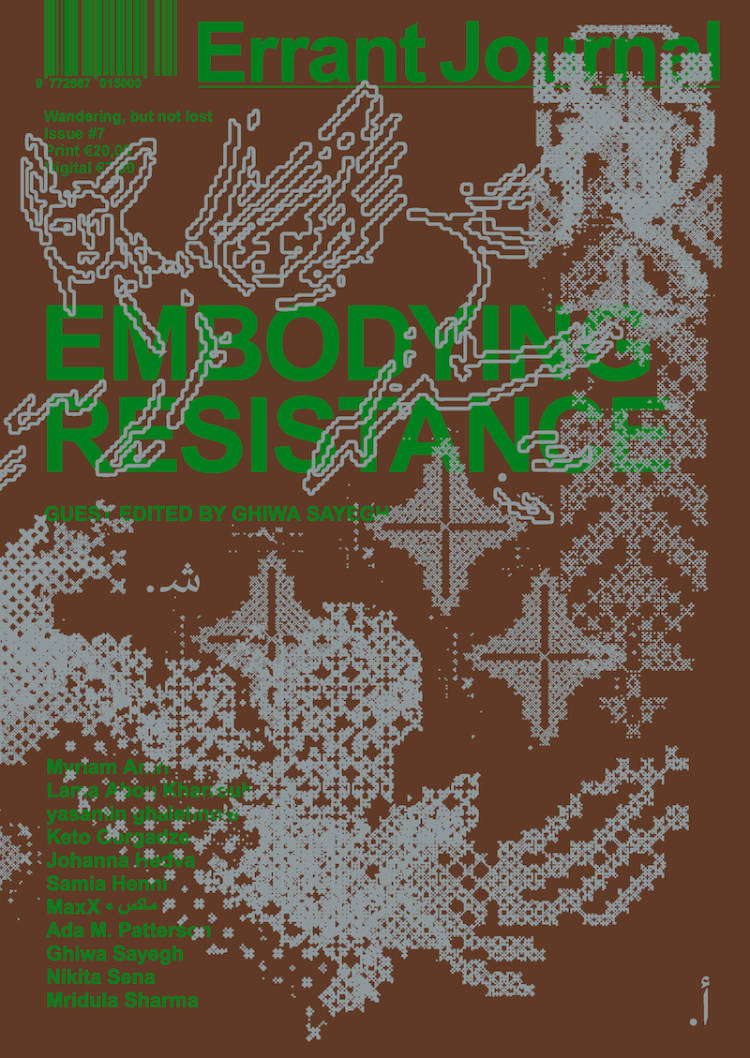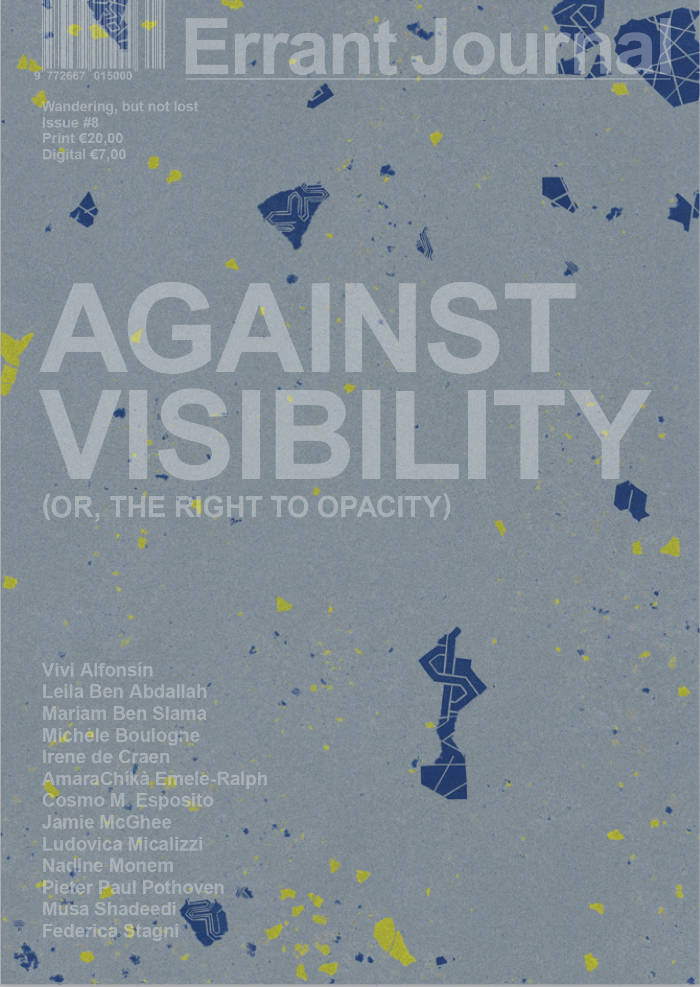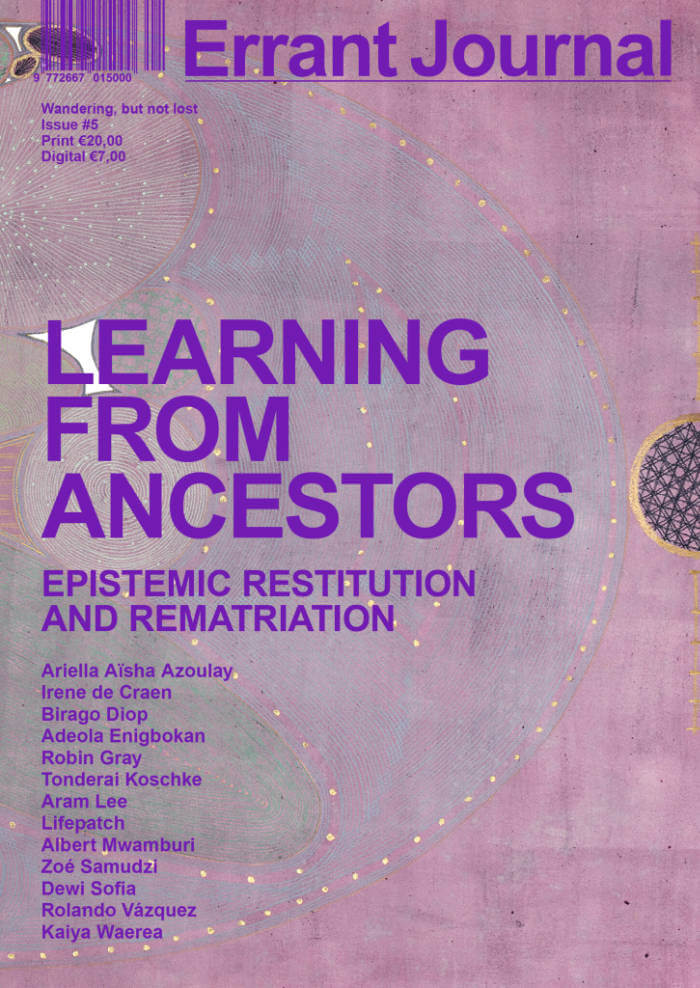Errant Journal
Errant Journal

Errant Journal 7: Embodying Resistance
The seventh issue of Errant Journal is guest edited by Ghiwa Sayegh and aims to interrogate the role of the body in strategies of resistance from below. Taking Palestine as a starting point, the ongoing genocide committed by Israel and other colonial powers and the people’s continued struggle for liberation inform the issue’s thinking and praxis. From this political standpoint, it explores the ways in which bodies – that are sexualized, criminalized, racialized, crip – have been able to divert and subvert in order to fight back. To resist from the body is what crip theory tells us is a matter of need. It is a body that no longer fears deviation, specifically because of how cheap our lives are considered and how dangerous our futures are treated. It is about finding community and kinship when we are told we are alone.
Contributors:
Myriam Amri, Lama Abou Kharroub, yasamin ghalehnoie, Keto Gorgadze, Johanna Hedva, Samia Henni, MaxX • ماكس, Ada Maricia Patterson, Ghiwa Sayegh, Nikita Sena, Mridula Sharma

Issue #8 - Against Visibility (or, the Right to Opacity)
The eighth issue of Errant Journal questions the ways in which hegemonic culture and discourse tends to prioritize the ideal of openness, access, transparency, and visibility. Delving into topics such as face coverings, ‘coming out’ in queer discourses, the use of opacity in transformative justice, and different strategies of (visual) resistance, ‘Against Visibility’ can be read as a proposition of refusal of the paradigm of visibility and access that permeates all areas of western thinking. At a moment in which representation and uncovering ‘lost’ histories are trending, Errant asks what is being erased in a world where everything must always be visible. When Édouard Glissant proclaimed the right to opacity, he sought not to be reduced or to be measured against an ideal scale in order to be understood and accepted. Expanding from this, Against Visibility looks into the ways in which unlearning imperialism also includes unlearning the ideal of visibility itself.
Contributors: Vivi Alfonsín, Leila Ben Abdallah, Mariam Ben Slama, Michèle Boulogne, Irene de Craen, AmaraChíkà Emele-Ralph, Cosmo M. Esposito, Jamie McGhee, Ludovica Micalizzi, Nadine Monem, Pieter Paul Pothoven, Musa Shadeedi, Federica Stagni

Errant Journal 5: Learning From Ancestors. Epistemic Restitution and Rematriation
Starting from the position that the return of all colonially looted, pillaged, and stolen heritage should take place in full and without hesitation, Errant Journal No. 5 ‘Learning from Ancestors’ wishes to go beyond the question of ‘giving back’, and ask what is given back by whom and to whom, where, and how? In this now seemingly omnipresent discussion, who is speaking, and which voices are being listened to? To do this, as is reflected in the title of this issue, Errant proposes a shift in perspective away from dominant (Western) epistemic authorities to consider other ways of sensing and experiencing the world and let this guide us in the questions we have. This necessarily means that this issue is not just about objects and their return, not just about physical ‘things’ that can change hands and location. It is also an issue about repair, without which restitution could be meaningless.
Contributors: Ariella Aïsha Azoulay, Irene de Craen, Birago Diop, Adeola Enigbokan, Robin Gray, Tonderai Koschke, Aram Lee, Lifepatch, Albert Mwamburi, Zoé Samudzi, Dewi Sofia, Rolando Vázquez, Kaiya Waerea

Errant Journal 6: Debt
Errant Journal No. 6 takes up the topic of debt in order to challenge the idea that it is something rational, natural or inevitable.
The contributions in the issue address the ways in which debt and its language hold power over us and organize obedience; from its role in geopolitics to its associations with shame and guilt through moral and religious connotations. Together they reveal how the personal is always connected to the structural. Crucially, the issue also features contributions that address ways of thinking about debt outside Western/neoliberal hegemony and introduce instances of resistance to the violence and inequality inherent to debt. We’ve made additional space in this issue to address the intensified struggle for Palestinian liberation and its relations to debt/guilt and finance.
Contributors: Ian Beattie, W.E.B. Du Bois, Sultan Doughan, Toon Fibbe, Ibrahim Kombarji, Levi Masuli, Jamie McGhee, Kristina Millona, Bahar Noorizadeh, Falke Pisano, Taring Padi, Dalia Wahdan